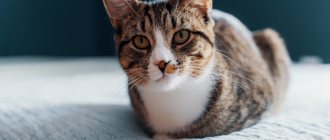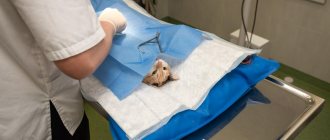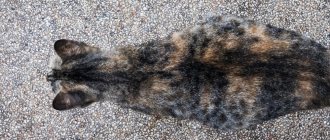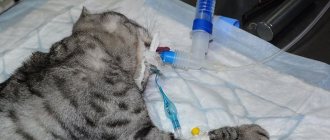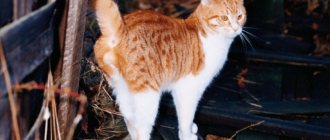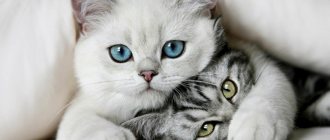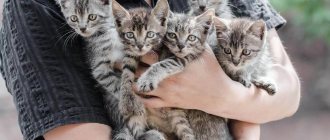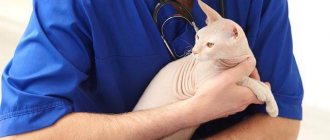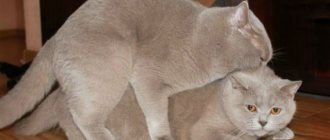Many cat owners are outraged when someone tells them they need to castrate their pet. But conscious breeders and owners understand that castration is not cruelty and that it is justified in cases where it is not a breeding animal. In addition, there is also castration for medical reasons, which certainly cannot be called cruelty. So why do you need to castrate a Maine Coon and what is the peculiarity of this operation?
A little theory
During castration of a Maine Coon, the animal's gonads are surgically removed. In cats these are the testes, and in cats these are the ovaries. Thus, the Maine Coon loses the opportunity to continue his race, and, in addition, his sex drive disappears. Castration is often used to correct a pet’s behavior. After all, after this operation, cats become calmer and less aggressive during estrus. Cats do not mark territory and do not fight with rivals.
Some owners of Maine Coon girls prefer to undergo tubal ligation rather than spaying, believing that this operation is more harmless to the pet. In fact, with tubal ligation, the cat only loses the ability to become pregnant and bear offspring, but the instincts calling her to reproduce remain.
Castration is not always carried out at the request of the Maine Coon owner. For some diseases, it is necessary to resort to castration for medical reasons.
How the animal’s character and habits change after the procedure
The temperament of neutered Maine Coons improves. Pets become calmer and more affectionate, and are loyal to other pets that live in the apartment. Cats stop estrus and the heart-rending screams that accompany them. Young Maine Coons remain interested in games. Mature individuals become lazy and rest most of the time.
Since physical activity in neutered Maine Coons is slightly reduced, the risk of obesity increases. In this regard, veterinarians recommend switching cats to dietary food with a high protein content.
Attention! After castration, it is necessary to carefully monitor the condition of the Maine Coon's heart and kidneys. It is recommended to undergo examination at a veterinary clinic at least 1-2 times a year.
Why is it necessary?
It is recommended to castrate a Maine Coon cat for the following reasons:
- Unpleasant odor due to cat marking territory.
- Fights with rivals, during which the cat can be seriously injured.
- Severe stress due to the fact that there is no way to satisfy the reproductive instinct.
- After castration, life expectancy increases approximately 1.5 times.
- The cat stops focusing on the reproductive instinct and begins to develop other interests.
Maine Coon cats are sterilized mainly in order to get rid of periodic estrus, as well as to minimize the risk of the animal developing diseases of the reproductive system.
Choosing a Maine Coon kitten
This article will not discuss the question: “How to choose a HEALTHY Maine Coon kitten?” A lot has already been written about this. Let's try to answer the following questions: “How to choose a Maine Coon kitten?” and “Why do people choose Maine Coons?”
What can be attractive about a Maine Coon? Firstly, it's its size. Cats of this breed are not much larger than cats of other breeds, but male cats are much superior to their counterparts in this indicator. At the same time, they are very sweet, kind and affectionate like dogs. Thanks to such a handsome man, friendship and communication with him gives his owner the opportunity to imagine himself for a second as a trainer of tigers or wild lions. Besides, I also want to brag about Kunischey to my neighbors and friends. Just imagine, guests come to you, sit, talk, sip glasses of wine (cognac, beer, tea...), and then HE appears: big, woolly, with a long luxurious tail, with lynx tufts on his ears and tufts of hair on his huge paws, and, in full view of everyone, freezes in the pose of a sphinx, proudly stretched out on the floor. Naturally, at first everyone freezes (drinks spill from glasses and cups), then they gasp and groan for a long time and congratulate the owners. But these are moments of triumph for the owner! For such minutes, you don’t feel sorry for the time and money spent on growing such a “beast”!
In addition to the size, you will probably be attracted to the Maine Coon by the combination of its menacing, wild, unapproachable appearance with an affectionate and kind character. Undoubtedly, you will observe with great interest all the behavioral features of such a pet: before drinking, he (she) rake the water with his paw, or how he eats food from his paw.
His voice does not at all match the appearance of this giant. You will be amazed to hear such a big cat say “meow” in a tiny voice.
A very attractive fact is that Maine Coons are a native breed.
Source
Features of a cat and a cat
Sterilization of a cat can be carried out either traditionally or by another method.
That is, the uterus and ovaries of the animal are removed through an incision on the abdomen, and by the endoscopic method, in which they are removed through small punctures.
The second option for performing the operation is more preferable.
With it, there is no surgical wound, as a result of which there is no need to care for the sutures and ensure that the wound surface does not become dirty.
It should be remembered that endoscopic sterilization is also performed under general anesthesia and there is also a risk when performing it.
Neutering a cat is much easier. This is not an abdominal operation, and therefore it is performed much faster, and the period of wound healing and recovery takes less time.
Can I be spayed during heat?
Can a cat be spayed while in heat? This question is perhaps the most discussed on the Internet. It is raised with enviable consistency by both doctors and animal owners. Moreover, there is no consensus in any camp. Half say it’s possible. Half is impossible.
What to do? The cat screams constantly, or every 3 weeks. Or she “flowed” in such a way that the white light was not pleasant either to herself or to the people next to her. The answer is clear: if your cat does not have breeding value and you do not want offspring from her, feel free to sterilize her. We, our team, have been laparoscopically sterilizing cats in completely different conditions for many years, and have not observed a single case of complications.
A couple of years ago we asked this question at an international veterinary forum: “Is it possible to sterilize cats during heat? And why?". About 200 specialists from all over the world responded to us.
The comments of Western experts agreed on approximately one thing - it is possible to sterilize, regardless of the presence of estrus, but the operation itself should be carried out on a clinically healthy animal, within the recommended age range, and would not have any abnormalities in the anamnesis (allergies to medications, etc.)
The comments of Russian veterinarians were somewhat varied and were distributed approximately as follows: half argued that it is possible to sterilize, period. Those who were against sterilization during estrus argued their positions as follows: the majority pointed to the increased risk of bleeding during surgery on the “current” uterus. A number of doctors are at risk of hormonal imbalance. There were also some rather unusual answers. For example:". during estrus, the ovaries are functionally active and when they are removed, there is a risk of dropping a piece of this organ into the abdominal cavity, where it will take root and begin to act like a real ovary. "
Source
Optimal timing
The optimal age for castration or sterilization is considered to be 9 - 12 months, although this operation can also be performed earlier - at the age of 5 - 7 months, that is, after the animal reaches puberty. At this age, the animal’s body is fully formed, making it easier for the cat to endure surgery and the rehabilitation period.
Intervention in early adulthood
Basically, it is carried out by nursery owners who do not want pet-class kittens to fall into the hands of people who will receive low-quality offspring from them or even mixed breeds and sell them under the guise of real Maine Coons. This operation is carried out at the age of 2 - 4 months, so that such a pet is already neutered when it arrives at its new home.
When carrying out early castration, there were no cases of negative consequences of the operation on the health or appearance of the pet.
The only exception when early castration cannot be recommended is if the kitten has cryptorchidism. Because it requires abdominal surgery. Because of this, the rehabilitation process is more difficult and may take longer. It is much wiser to wait until the usual time for such an operation, since this deficiency in many kittens goes away with age.
In adulthood
After a cat reaches the age of seven, castration is recommended only for medical reasons, since surgery using general anesthesia is much more difficult to tolerate in adulthood than in earlier years. This does not mean that you need to completely abandon castration. But if the decision has already been made to perform this operation on a cat, then it is necessary to conduct the most thorough veterinary examination of the pet as possible.
Important Features
Unfortunately, there are many prejudices generated by ignorance around the castration (sterilization) of animals. Pet owners often wonder: is castration of a Maine Coon really necessary? Will an animal that has lost the ability to reproduce become inferior? Is the operation associated with unbearable pain?
[ads-pc-1] Opponents of castration insist that this procedure is unnatural, forgetting that in the wild the reproductive cycle of animals depends on the length of daylight hours. A wild animal usually produces offspring once a year, during the most favorable period for this, and the rest of the time the female’s body recovers and prepares for the next reproductive cycle.
After the cat became domesticated, the natural rhythms of life, tied to daylight hours, were disrupted, and the amount of food became constant regardless of the season. The animal has gained the opportunity to reproduce several times a year, which has an adverse effect on the body condition of a cat that gives birth frequently and a lot.
If a pet cannot satisfy the instinct of procreation, its life becomes endless stress. The animal begins to scream and mark its territory, which causes inconvenience to the owners, but first of all, the cats themselves suffer. The character of a “full-fledged” cat, deprived of the opportunity to mate with a cat, deteriorates - he becomes nervous, unsociable, and sometimes aggressive.
A cat, overwhelmed by the reproductive instinct, can run away, fall out of a window, get lost, or get hit by a car. If the fugitive does return home safely, he may bring not only parasites, but also infections from the street. Attempts to “calm” a pet with hormonal drugs such as “CounterSex” often lead to serious diseases, including cancer.
Preparation
Before castration, it is necessary to conduct a full examination to identify pathologies of the cardiovascular system and internal organs.
This is necessary in order to minimize the risk that the pet will not tolerate anesthesia.
The necessary studies include ultrasound and ECG of the heart, and it is also advisable for the Maine Coon to be examined by a cardiologist.
Before castration, an adult animal cannot be fed for 12 hours, and watered for 4 hours. For kittens up to 4 months, the fasting time is reduced to 4 hours.
Contraindications and possible complications
In some cases, the animal is not allowed to undergo surgery. Contraindications to castration are as follows:
- there are signs of an infectious disease;
- period of exacerbation of chronic ailments;
- Maine Coon is infected with parasites;
- heart, kidney or liver problems;
- epilepsy;
- severe exhaustion;
- respiratory diseases, including asthma;
- estrus;
- pregnancy and lactation;
- postpartum period (up to 1 month);
- lack of vaccinations.
How does the operation take place?
In cats:
- Premedication is carried out.
- The animal is placed on the surgical table, where the surgical field is processed.
- The cat is given anesthesia.
- Incisions or punctures are made through which the equipment necessary for the operation - a laparoscope or endoscope - is inserted into the animal's abdominal cavity.
- The uterus and ovaries are fixed and removed.
- If the length of the cut or puncture is no more than 1 cm, then their edges are connected using special medical glue. If the length of the surgical wound is greater, then sutures are applied.
- Finally, treatment with an antiseptic is carried out.
Until the cat comes to its senses after anesthesia, it is not given to the owner.
Many clinics offer a service such as leaving your pet in the hospital for a day after surgery. If there is such an opportunity, then it should not be neglected.
For the cat:
- Premedication is carried out.
- The surgical field is being prepared.
- The cat is given anesthesia. After the animal falls asleep, the testes are removed through small incisions.
- If the incision is large, then the edges of the wound are sutured and treated with an antibiotic. Small surgical wounds can be treated without stitches.
- Until the cat comes to his senses, he remains under the supervision of a veterinarian, after which he is given to the owner.
In addition to the surgical method of castration, there are also chemical and radiation methods, but their use is very harmful to the health of the pet and therefore it is not recommended to resort to them.
Maine Coon diseases: Vaccinations, castration, childbirth
Cats are very smart and they rarely overeat.
Often, non-castrated animals can suffer from gluttony due to lack of human attention and metabolic disorders. Also an important role is played by nutrition and the diet that is fed to the cat (but more on that in the topic about nutrition). The degree of obesity directly depends on the age, active lifestyle and nutrition of our pets. Every owner of a sterilized animal should know that the diet of their kittens after a year should not be too high in calories and they should lead a fairly active lifestyle, then they will not have any problems with obesity. — Another interesting point associated with early castration is that sex hormones affect the growth of the skeleton of cats and cats, and surgery performed at an early age prolongs the growth time of bone plates. Thus, the growth of long bones increases and, as a result, the animals grow a little larger. This fact has already been scientifically proven and it has been revealed that such animals live longer and have better health than their counterparts castrated after puberty.
— One of the most important reasons why owners refuse early castration is supposedly a disease of the genitourinary system that occurs after surgery. It has been repeatedly scientifically proven that the occurrence of urolithiasis (urolithiasis) is directly related to poor nutrition and genetic inheritance. Also, the conditions in which the cat is kept play an important role in this, because... If you frequently lie on a cold floor and have a cold in the bladder, there is a risk of cystitis, which can also cause the occurrence of urinary tract infections.
- Many are afraid that their kitten will not tolerate anesthesia... For a physically healthy animal, with the right dose and a good veterinarian, anesthesia does not pose any danger to kittens. On the contrary, small kittens tolerate anesthesia much easier and recover from this condition faster than older animals.
— The undoubted advantage of early castration is the elimination of the development of ovarian tumors, pyometra and mammary gland cancer, and cats never suffer from empty heats, cats are not at risk of testicular cancer and prostate problems.
The main thing is to follow some rules before the operation:
The kitten must be vaccinated and must undergo worm prevention before vaccination,
Do not feed the kitten before surgery for at least 4 hours.
After the operation, do not expose the baby to drafts and keep him in a warm room (if possible, place him on a heated surface),
Until the kitten has completely recovered from the anesthesia, do not allow it to move freely around the room in order to avoid fractures of the limbs and spine when trying to jump somewhere. It is advisable to close it in a carrier or basket.
So, we see that early castration has a number of advantages, in addition to which, your male cat will always be in excellent shape, will not get sick or suffer from heat, and will live a long, carefree and happy life next to you, delighting you with its gorgeous appearance and excellent behavior.
We are pleased that recently more and more people prefer to take an already castrated (sterilized) animal from the nursery, thereby avoiding all sorts of dangers and worries associated with the operation. And this decision is reasonable, the breeder has more experience and always has proven and reliable veterinarians who will minimize all risks. We have experience on this issue and many of our graduates who have had this operation at an early age have already grown up and delight their owners with excellent health and size.
We really hope that this article will help you make the right choice.
We wish you and your pets health!
Any operation is a burden on the animal’s body, so it is important to properly prepare the animal for it by undergoing a comprehensive health examination
Further care
The first days after surgery, you need to carefully monitor your pet.
In order to notice possible complications in time and, if they occur, immediately contact the clinic.
Postoperative care for the Maine Coon itself includes monitoring the condition of the surgical suture and treating it with an antiseptic recommended by the doctor.
You cannot feed a cat for 5 - 8 hours, but he can drink water.
In order to avoid infection of the surgical wound, it is necessary for the Maine Coon to go into an empty litter box for the first 5 days after surgery.
As a last resort, you can leave only the thinnest layer of filler, but only when the pet categorically refuses to use an empty tray. To prevent the cat from licking the stitches, a postoperative blanket is put on it. You can also put a special bell-shaped collar on the animal, which prevents the Maine Coon from licking itself. At first, the pet can be fed with regular food, but later it will be necessary to switch it to special dietary food for neutered cats and female cats.
Postoperative care for animals
After surgery, your Maine Coon needs good care. When recovering from anesthesia, the cat feels nausea and dizziness, coordination of movements is impaired, and the animal does not orient itself in space.
Upon returning home, it is better to place the Maine Coon on a waterproof diaper on the floor - he may fall off the sofa. It is advisable to be close to your pet and make sure that he does not get up. After castration, it is better for a cat to wear a collar around his neck, which will prevent the animal from licking the wound. Cats have a blanket placed over their bellies. The owner must monitor the condition of the stitches and treat them daily with a product prescribed by the veterinarian.
The Maine Coon is not fed for 4 hours after castration. Water can be offered after 1.5 hours. Some animals may vomit, others may urinate spontaneously. This is normal, there is no need to panic. For several hours after castration, the animal feels severe chills, so it is better to cover it with a blanket or blanket.
Cats recover quickly after castration. The incision site on the scrotum heals within a couple of days. Rehabilitation of cats takes longer – up to 2 weeks. The sutures are removed on the 10th day. But even after this, it is advisable not to allow your pet to run and frolic for at least 3-5 days.
Why castrate
In Europe and America, castration is perceived as a natural and necessary process. In Russia there are many opponents of the procedure, who believe that it is unnatural and brings pain to the pet. At the same time, people forget that the cat is domesticated and its reproductive cycles have gone astray. And if the owner cannot ensure the satisfaction of instincts, then he dooms the pet to constant stress.
Breeders agree that not castrating a cat means abusing him. This affects the animal’s psyche, causes urological diseases, and makes life shorter.
Benefits of castration for Maine Coons:
- Lifespan increases by almost 1.5 times due to the absence of stress due to hormones.
- The risk of developing urolithiasis (urolithiasis) in cats is reduced by 30%. Neutered cats suffer less from fibroids, cysts, and cancer.
- With properly organized nutrition (neuters need 30% less calories), their size increases due to muscle building, not fat deposits. And most owners want to raise a giant Maine Coon.
- The character of a castrated animal is more friendly. Even Maine cats, distinguished by their independence, become affectionate, human-oriented, and try to spend more time with him.
Castration options
Castration of a Maine Coon, like any other animal, is carried out under the guidance of a qualified veterinarian in a sterile operating room equipped with all the necessary equipment. This eliminates the risk of any infection or infection.
Before the operation, the pet is prepared, namely:
- give anesthesia;
- shave the hair in the scrotum area;
- treat this area with an antiseptic.
The procedure itself can be performed in two ways: open and closed. Each of them has its own characteristics, but in both cases it is necessary to dissect the tissue, remove the testis and treat the wound with an antiseptic.
Sutures, as a rule, are not used during such operations, since the wound quickly heals on its own. The rehabilitation period takes up to two days on average.
Why castration is needed, pros and cons
Castration is an operation as a result of which a cat loses its testes (testicles). The animal’s hormonal background changes, libido drops, the pet stops marking its territory and screaming at night, demanding the cat’s attention.
Under the influence of sex hormones, animals require communication with the opposite sex. This is a natural behavior necessary for the continuation of the cat family. If the cat lives in a private house, then there are no problems with the implementation of the program for the reproduction of offspring. But in an apartment, a clash of interests inevitably arises. The owner is irritated by the endless night meowing, and the poor animal cannot do anything about its instincts. It is in this case that all veterinarians recommend castrating your pet. There will be no particular harm, but there will be much more positive aspects.
If you are not going to breed the breed and sell kittens, then it is better to castrate your Maine Coon. This will not only save the animal from suffering, but will also improve the quality of life of both the cat himself and the rest of the household.
Pros of the operation
- No late-night concerts or noxious aroma coming from cat marks.
- Improvement of character, reduction of aggression during the period of spring exacerbation.
- Increasing your pet's lifespan. According to statistics, neutered Maine Coons live several years longer than their “dignified” counterparts.
- Reducing the risk of developing some serious diseases. Castration – prevention of prostatitis and prostate adenoma.
- There is no chance of contracting infectious diseases that affect most yard animals. Sexual instincts push well-groomed and healthy pets to rash actions - running away from home and mating with street cats. With close contact, your pet may “catch” an infection, the treatment of which will fall on the shoulders of the owner.
In general, neutered animals are more focused on communicating with humans rather than seeking adventure. Entertainment such as fights with competitors over defending territory and intimate meetings under the moon are no longer of interest to the cat after the operation
Sexual desire fades away and is replaced by the second most important instinct - nutrition. The most important thing here is to keep the diet balanced and not to overfeed the animal, then the risk of urolithiasis will decrease

